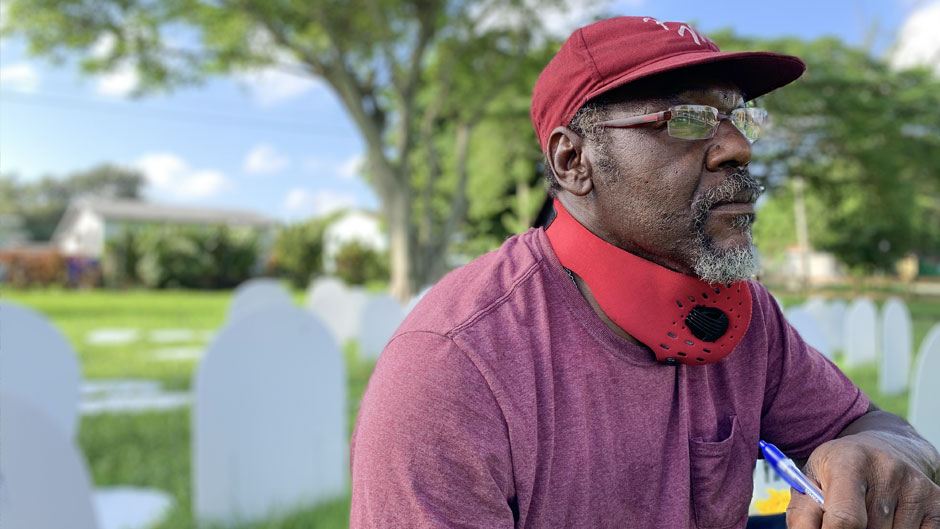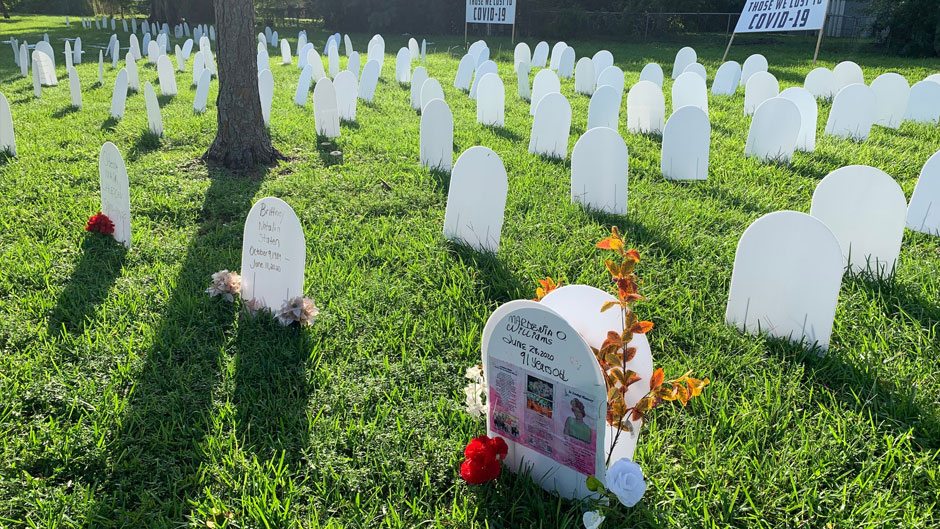It was supposed to be a showdown on wheels—Kurris Presley’s supercharged Camaro RS against his uncle Andre’s Mustang 5.0. The two had planned the quarter-mile drag race to settle a friendly argument over who was better at souping up cars. But the race never happened. A month before the contest, the 63-year-old Andre lost to a much more menacing opponent—COVID-19.
“He died in the hospital,” Presley said. “I couldn’t even visit him.”
The two grew up together in one of South Florida’s predominately African American communities, playing sports, going to movies, and working on cars. “Andre taught me much of what I know about being a mechanic,” Presley said. “Now, whenever I see his Mustang sitting in his driveway, I can’t help but think about him.”
His uncle’s death is emblematic of the way COVID-19 is disproportionately harming racial and ethnic minorities in the U.S., with growing data from a wide range of sources showing that those groups not only test positive for the coronavirus at higher rates than whites but are also significantly more likely to be hospitalized because of the virus. And the disparities are not limited to infections and hospitalizations. High rates of death in Black, Native American, and Latino communities have also been reported.
“What this pandemic has shown us, among many other things, is how persistent inequities are,” said Guillermo “Willy” Prado, vice provost for faculty affairs, dean of the Gradate School, and professor at the University of Miami. “It’s another example of continued disparities among underrepresented groups.”
But to know why the disparities persist isn’t simply a matter of pointing a finger at any one specific cause. “It’s a confluence of many factors,” said Victoria Behar-Zusman, a professor in the University of Miami School of Nursing and Health Studies and co-principal investigator of the Center for Latino Health Research Opportunities (CLaRO), a joint University of Miami-Florida International University initiative that addresses a range of health issues affecting Latino populations.
African American and Latino populations, Behar-Zusman explained, are more likely to work in jobs that expose them to the virus, “jobs where they are not able to work remotely from home—essential jobs such as those in the food and health care industries, construction, and elder caregiving, many of which continued during the shutdowns,” she said.
Presley’s uncle, who is a mechanic, sustained a severe fracture while repairing an automobile engine and had to be admitted to a hospital, where he contracted the virus. Once it took hold of him, he deteriorated rapidly, a ventilator and other medical interventions unable to save him.

Underlying health conditions
The hypertension from which Presely’s uncle suffered and took medication to control is one of the chronic health conditions that disproportionately impact minority populations and put them at a higher risk of experiencing grave illness and even death from the virus.
“Just look at the underlying medical conditions of U.S.-laboratory confirmed COVID-19 hospitalizations, and you will notice that most are conditions that are common among people of color, such as hypertension, obesity, and heart disease,” said Imelda Moise, an assistant professor and health geographer in the University of Miami College of Arts and Sciences.
Moise, who recently published a study in the journal Preventing Chronic Disease that pinpointed where in Miami-Dade County the virus is being transmitted and contracted, said the link between other social determinants of health and COVID-19 cannot be ignored, noting that housing conditions, poverty, and other factors play a major role in the virus’s impact on vulnerable populations. “If you are unemployed, chances are you are uninsured. And when you think about social distancing, if you are in a house where you cannot self-isolate, that increases the chances of you transmitting the disease to your family members,” she said.
Robin Bachin, the Charlton W. Tebeau Associate Professor of History and assistant provost for civic and community engagement, echoed Moise’s last point. “We know that there are underlying chronic conditions that a lot of members of these groups confront as a result of living in dense urban corridors,” she explained.
Working with Miami-Dade’s Public Housing and Community Development department, Bachin and her group are examining the impacts of COVID-19 from the perspective of “how we think about affordable housing and what kinds of amenities are necessary for residents.”
“Much of our affordable housing is very dense, and there isn’t a lot of outdoor public space,” Bachin said. “So, we’re in conversations with them about their projects on the renovation and modification of existing affordable housing as well as building new affordable housing. How can they rethink what that looks like, given COVID-19?”
Implicit bias
Then there is the issue of implicit bias in the treatment of the coronavirus, said Moise, alluding to the fact that some Black people with coronavirus symptoms who visit health care providers may be less likely than other patients to be tested and treated for the virus. She noted the case of Reginald Relf, a 50-year-old African American engineer who visited a suburban Chicago urgent care clinic while experiencing a fever, cough, and labored breathing, only to be sent home without being tested for the coronavirus. A week later, he was found dead.
“Had he been of a different race, would he have been treated?” Moise asked. “There are iterations with providers that may discourage people of color from seeking care. The dehumanization of Blacks within the health care system dates back to John Brown’s narrative in ‘Slave Life in Georgia.’ Some 160 years later, a paper published in the Proceedings of the National Academy of Sciences found similar racial bias among medical students regarding biological differences between Blacks and whites.”
Unnaturalized immigrants also face greater risk from COVID-19, forgoing testing because of they fear being deported, said Behar-Zusman. And with no access to unemployment benefits or health insurance, many of them, she added, continue to work in jobs that expose them to the virus.
Residents in vulnerable communities also sometimes lack information about COVID-19 or are misinformed about the virus, according to Behar-Zusman. As such, the ClaRO initiative she helps lead is partnering with the National Institutes Health’s Community Engagement Alliance to address misinformation about the coronavirus in minority communities.
A mobile clinic responds
The Miller School of Medicine’s Pediatric Mobile Clinic has been providing health care to minority populations since 1992, when it was established in response to the devastation caused by Hurricane Andrew in southern Miami-Dade.
When the pandemic spiked in the county over the summer, the clinic shut down. But Lisa Gwynn, associate professor of clinical pediatrics and public health sciences and medical director of the clinic, fought to get it back up and running again, realizing that the vulnerable populations it served would need assistance.
When the unit, as well as a second van, hit the streets again, they visited sites in Miami, Hialeah, Homestead, and elsewhere, delivering much-needed health care to patients. One of the mobile units was specifically dedicated to testing children for COVID-19—sometimes as many as 200 kids a day, according to Gwynn. “Our patients needed us,” Gwynn said. “If we didn’t get operational again, they wouldn’t have had anywhere to go, especially the little kids.”
The pandemic affected 51-year-old Virginia—who takes her 14-year-old daughter, Francesca, to the clinic—especially hard. While she and the immediate members of her family did not contract the virus, her husband lost his construction job and she couldn’t find work as a housekeeper, leaving the Homestead resident no alternative but to visit food banks and pantries to keep meals on the table. The fact that the clinic operated during the height of the pandemic was a godsend for Virginia. “It gave me one less thing to worry about,” she said.
Even as the clinic’s medical staff treated patients, they were acutely aware of the virus’s impact on marginalized groups. “We prioritized those areas where we knew there were a lot of underserved individuals who face barriers like accessing COVID-19 testing and screening,” said Dr. Mikey Maurer, assistant professor of clinical pediatrics.
On a recent Tuesday morning, Presley visited Simonhoff Floral Park in Miami’s Liberty City, where 500 temporary headstones have been erected to represent the many victims of COVID-19 in Miami-Dade. The white, plastic headstones are just a fraction of the more than 3,600 people in Miami-Dade who have died from the virus.
“We chose Liberty City for the memorial cemetery because this pandemic has also exposed inequities that make Black people and other people of color more vulnerable to COVID-19,” Florida Congresswoman Frederica Wilson said at the public ceremony for the memorial. Wilson partnered with the Circle of Brotherhood, Miami-Dade Commissioner Audrey Edmonson, and others to make the memorial possible.
As Presley knelt and wrote his uncle’s name on one of the headstones, he said, “Andre, you will always be loved and remembered.”

